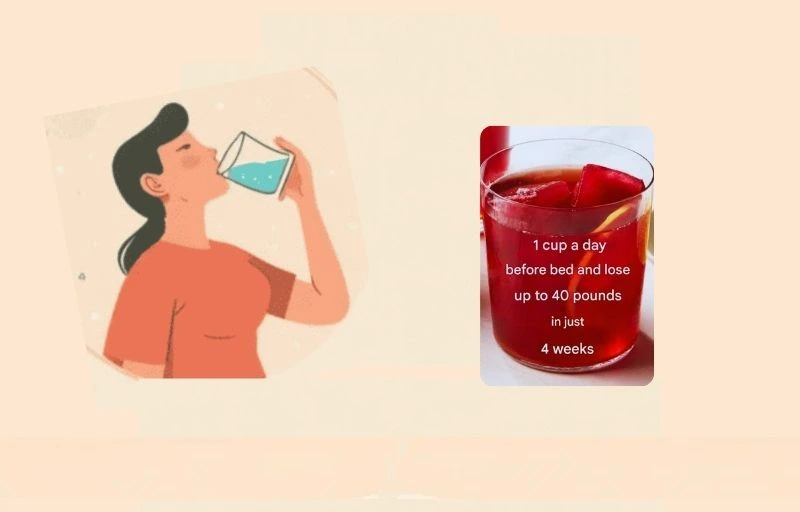Dropping 5.5 kg (12 pounds) in just three days may sound like the ultimate weight loss success story, but the reality is far from healthy. Medical experts strongly warn against such extreme methods, as the weight lost isn’t actual fat but mostly water weight. Even worse, these rapid results can cause serious health problems, including dehydration, electrolyte imbalance, and even cardiovascular strain.
If you’re curious about how people manage to shed weight so quickly — and why it’s not safe — here’s a detailed look.

How People Rapidly Lose Weight (And Why It’s Risky)
Important Note: These methods are shared for informational purposes only. They are not recommended for safe or sustainable weight loss.
1. Severe Water Restriction
- What Happens: Individuals drastically cut their water intake or use extreme “water cutting” techniques.
- Why It Works Temporarily: Reducing hydration forces the body to release retained water, causing a dramatic drop on the scale.
- The Health Risks: Dehydration can lead to dizziness, headaches, dangerously low blood pressure, confusion, and in extreme cases, organ failure.
2. Extremely Low-Carb Diets
- What Happens: They consume fewer than 20–30 grams of carbohydrates daily.
- Why It Works Temporarily: Carbohydrates are stored with water in your body. When carb intake is slashed, glycogen levels plummet, and excess water is flushed out.
- The Health Risks: Severe carb restriction can cause fatigue, mood swings, poor brain function, and heart strain over time.
3. Excessive Sweating Techniques
- What Happens: Activities like long cardio sessions, sauna use, hot yoga, or wearing sweat suits are utilized.
- Why It Works Temporarily: Sweating leads to massive water loss in a short period.
- The Health Risks: Sweat contains essential electrolytes like sodium and potassium. Losing them without proper replenishment can trigger muscle cramps, heart rhythm disturbances, or even heart failure.
4. Extreme Calorie Cutting or Fasting
- What Happens: Some individuals eat extremely low-calorie diets — often under 500–800 calories a day.
- Why It Works Temporarily: Minimal food intake quickly reduces glycogen and gut content, leading to a lighter body weight.
- The Health Risks: Severe calorie restriction can damage metabolism, weaken the immune system, and cause gallstones.
5. Misuse of Diuretics or Laxatives
- What Happens: Use of over-the-counter or herbal substances that promote fluid loss through urination or bowel movements.
- Why It Works Temporarily: Forced fluid elimination leads to immediate weight reduction.
- The Health Risks: Electrolyte depletion, kidney failure, irregular heartbeats, and even death can result from this dangerous practice.
Why It’s Not Real Fat Loss
- Water loss makes up most of the initial weight drop — not body fat.
- True fat burning requires maintaining a moderate calorie deficit over time.
- Safe and sustainable fat loss typically happens at a rate of 1–2 pounds (0.5–1 kg) per week.
When you lose 12 pounds in just three days, you are mostly losing water, stored carbohydrates (glycogen), and undigested food — not body fat.
Healthy Alternatives for Long-Term Weight Loss
If you’re serious about lasting results and better health, here’s what doctors and fitness experts recommend:
- Aim for 1–2 pounds of fat loss per week with sustainable changes.
- Follow a balanced diet filled with leafy greens, lean proteins, healthy fats, and whole grains.
- Stay properly hydrated with water, herbal teas, and electrolyte-rich drinks.
- Combine strength training and cardiovascular exercise for maximum fat-burning.
- Prioritize sleep and reduce stress to help regulate hunger hormones and boost metabolism.
Final Takeaway: Choose Health Over Quick Fixes
Rapid weight loss may seem appealing — especially if you have an event coming up — but it comes with serious risks that can harm your long-term health. Temporary water loss is not true fat loss, and the weight often rebounds just as quickly.
Real weight loss success comes from patience, consistency, and a commitment to self-care. Focus on building a healthier lifestyle, not chasing overnight results. Your body — and future self — will thank you.
